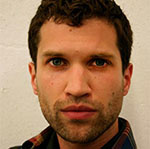Patrick Reed graduated with a Master in Fine Arts in papermaking and bookbinding from the UI Center for the Book in 2013. He received a Fulbright grant in 2014 to the Rachel Carson Center for Environment and Society at Ludwig Maximilian University in Munich, Germany, for his project “Apocalyptic Themes of Natural Disaster in 16th and 21st Century Woodcut Prints.” He is currently back in Germany continuing his research through a DAAD Study Scholarship and Research Grant. International Programs interviewed Patrick to get his insights on living abroad, and how the experience affected his research.

Tell us a little about your project.
The purpose was to research sixteenth-century German woodcuts prints that depicted apocalyptic natural disasters. I used the research I prepared as a foundation for creating my own body of contemporary work that reflected the same themes in the twenty-first century. So, it was drawing connections between past and present, and also between extreme weather conditions in Iowa and Germany. Flooding would be the most particular example, and then triangulating between time and geography.
Why the sixteenth-century?
Similar environmental disruptions to the twenty-first century were happening, and so, the documents were interesting to observe how people responded to those disruptions through their aesthetics, through news reports, and so on.
What did you first notice once you arrived and were settled in?
I quickly realized that my German was not as good as it needed to be. When this realization happens, you are suddenly stripped of all your resources, so-to-speak. You have to go with your intuition or do things perhaps out of your comfort zone, such as asking people for directions and be self-reliant.
Were you able to find a community or group of friends?
I had great colleagues at my affiliation. There were Germans, but also people from Argentina, Sweden, and all over the world. We experienced the newness of the city and Germany together. Being in a group of people with many different perspectives made it great to share newness together, because the experiences became that much more enriched.
Everyone experiences culture shock. Explain what that was like for you.
I certainly had a bit of culture shock. Germany isn’t drastically different in terms of Western societies, but it was different enough that I didn’t know the particularities of how to act in public. You begin to second-guess the most basic things: grocery shopping, crossing the street. For instance, I was told that if you cross the street at a red light, you will be yelled at, and I was at first terrified of crossing the street! So, you become very self-aware, but that’s good, because then you are receptive to what it means to be in a culture that is different to your own.
You mentioned Germany being similar enough to other Western societies, but different in its unique culture. Can you describe a moment when you became aware of those subtle cultural nuances?
The biggest “aha” moment came when speaking in English with other Germans or non-native speakers of English, and I realized how colloquially I spoke English. It was really revealing how many weird phrases I used or jokes that went over their heads. I stopped trying with humor pretty quickly. They’re a tough crowd!
Did you miss home a lot?
I’m excited to go back to Germany! I thought of home a lot.
Aside from inspiring you to go back on a DAAD grant, what opportunities has the Fulbright created for you since your time in Germany?
Out of this research, I have been invited to participate in a six-day retreat in northern Norway and Russia on the Border Zone at an old industrial site that is very damaged by industry and pollution. Several artists will be interacting with this space with an eco-critical mindset, and that wouldn’t have happened for me had I not been placed in that initial research situation.
Would you say the Fulbright has changed your research and academic path in ways you weren’t expecting?
Most certainly. I have a solid arts background, and I was going on that path. With the Fulbright, I was immediately put into an academic research situation where everyone was, say, an eco-critic or an environmental historian, so I had to research to catch up to the basics of their specialties. Once I was able to engage in conversations with them, their ideas on environmental history and criticism became really important and interesting to me, and has since influenced the initial Fulbright work.
Traveling undoubtedly forces us to learn about ourselves and become self-reliant. Do you have any experiences reflecting this effect?
When you’re traveling completely alone in a totally different place, and you don’t have a phone, and no one knows where you are, and you don’t realize that maybe the train is going to split in two and go in completely different directions and its getting dark, and you just have to prepare to deal with it, for whatever is going to happen. You learn about frustration. You learn about isolation. But then, you learn how to get through that. And when you do, it’s really rewarding. It’s when you can deal with those challenges, and they don’t intimidate you any longer.
For more information on student funding, including the Fulbright grant and the DAAD Study Scholarship, explore our Student Grants and Fellowships page.